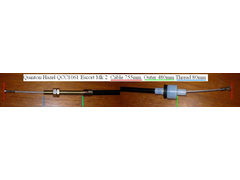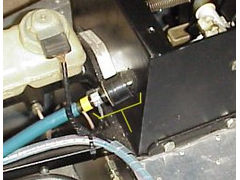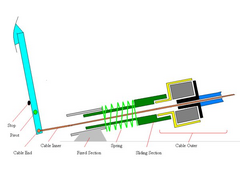Dusty
|
| posted on 24/5/06 at 12:50 PM |

|
|
Clutch arm rattle
2L zetec to type 9, MNR pedals. There is a loud rattle from the release arm and bearing which goes completely on pressing the pedal. (opposite of
bearing wear)
Am I right in thinking the sierra is designed to have the release bearing held firmly against the diaphragm springs by the pedal quadrant spring so
the bearing is always spinning?
If so and I rig a spring to do this how do you avoid having the clutch takeup in the first half inch of pedal travel? I like it in the middle of pedal
travel.
|
|
|
|
|
flak monkey
|
| posted on 24/5/06 at 12:57 PM |

|
|
The release arm should be loose when theres no pressure on the pedal. How loose I dont know, but I am sure someone can give you some idea 
Sera
http://www.motosera.com
|
|
|
David Jenkins
|
| posted on 24/5/06 at 01:28 PM |

|
|
I copied the Escort pedal layout, which has a strong spring to hold the pedal to the 'off' position. This tension on the cable holds the
release arm firmly - so no rattles.
David
|
|
|
Dusty
|
| posted on 24/5/06 at 01:36 PM |

|
|
I'm confused here. The sierra seems to have tension on the cable from the pedal end and that can only pull the clutch arm forward onto the
diaphragm. Is the escort spring on the release arm pulling back off the diaphragm?
I always assumed the bearing was held clear of the diaphragm when the pedal was not depressed but that doesn't seem to be the case in the
sierra. Or am I missing something?
[Edited on 24/5/06 by Dusty]
|
|
|
David Jenkins
|
| posted on 24/5/06 at 01:58 PM |

|
|
Got me thinking now! I'll have to look tonight...
... I believe that it pulls in the 'off' direction, as if your foot was on the pedal very slightly (so I was probably wrong earlier!).
You have to pull the pedal up to check that you have the right amount of travel.
But I will check...
David
|
|
|
Macbeast
|
| posted on 24/5/06 at 02:46 PM |

|
|
I think it very unlikely clutch release bearing would be permanently in contact with the diaphragm. My Sierra manual says there is an automatic
adjuster on the clutch cable at the pedal end. I think it pre-loads the clutch cable slightly so that the pedal is held 10 - 15 mm off the pedal
stop.
There must be a simpler way, say with a clutch cable ending in threaded rod at release arm for adjustment.
|
|
|
David Jenkins
|
| posted on 24/5/06 at 02:55 PM |

|
|
With my setup, I do have a manual adjuster. I have used a clutch cable from a Cortina or Capri - at the pedal end it has a loop that fixes using a
pin through the top of the pedal. At the gearbox end it has a threaded outer that goes through a hole in the bellhousing - this allows adjustment
using a couple of nuts.
Pictures can be provided if necessary! 
David
|
|
|
britishtrident
|
| posted on 24/5/06 at 04:08 PM |

|
|
A few different systems used by Ford over the years --- in common with some other 70s cars some Escorts used manual adjustment with "rising
pedal" this had no spring on the pedal, the clutch cable was simply adjusted to bring the clutch pedal (almost) level with brake pedal. No
pedal stop was fitted to the pedal so as the clutch wore the clutch pedal would rise above the brake indicating it required adjustment. With this
system you can put a light spring on the clutch arm to hold it in contact.
|
|
|
Dusty
|
| posted on 24/5/06 at 08:19 PM |

|
|
What I would realy like to ask of anyone who is using sierra pedals or still has the donor, 'Would you be kind enough to check in real life,
Does the release arm press the bearing firmly up against the clutch at rest or not?'
|
|
|
Macbeast
|
| posted on 24/5/06 at 08:47 PM |

|
|
It's pouring with rain, but I'll check tomorrow 
|
|
|
stevebubs
|
| posted on 24/5/06 at 09:14 PM |

|
|
quote:
Originally posted by David Jenkins
With my setup, I do have a manual adjuster. I have used a clutch cable from a Cortina or Capri - at the pedal end it has a loop that fixes using a
pin through the top of the pedal. At the gearbox end it has a threaded outer that goes through a hole in the bellhousing - this allows adjustment
using a couple of nuts.
Pictures can be provided if necessary! 
David
This is what I have, too - it's from a Capri is it?
[Edited on 24/5/06 by stevebubs]
|
|
|
Dusty
|
| posted on 24/5/06 at 10:35 PM |

|
|
I have the Escort cable, shortish, adjustable, eye one end and standard type 9 mushroom the other but that was not the question.
 
Rescued attachment DSCN0749.jpg
|
|
|
David Jenkins
|
| posted on 25/5/06 at 07:29 AM |

|
|
OK - my point was that the pedal's spring keeps the whole cable linkeage slightly in tension, so the lever arm doesn't rattle around. The
adjustable end of the cable allows you to move the 'at rest' position to suit your needs.
David
[Edited on 25/5/06 by David Jenkins]
|
|
|
NS Dev
|
| posted on 25/5/06 at 09:12 AM |

|
|
quote:
Originally posted by Dusty
What I would realy like to ask of anyone who is using sierra pedals or still has the donor, 'Would you be kind enough to check in real life,
Does the release arm press the bearing firmly up against the clutch at rest or not?'
Dusty - on the sierra the adjuster quadrant is indeed sprung and pulls on the cable all the time which keeps the release bearing in contact with the
clutch permanently.
David - most non-automatic adjusting clutch pedals are sprung downwards, again to keep tension on the cable and to load the release bearing lightly
against the clutch spring fingers.
In both cases, if this were not done, the cable would release itself from it's end fixings and come adrift, as the end fittings rely on slight
tension to keep them in place.
Even on my saab concentric cylinder setup, the bellows that covers the cylinder is sprung to keep the cylinder forward and the bearing in contact all
the time.
The days of adjusting a clutch to keep a clearance between the bearing and fingers disappeared long ago!
Retro RWD is the way forward...........automotive fabrication, car restoration, sheetmetal work, engine conversion
retro car restoration and tuning
|
|
|
Dusty
|
| posted on 25/5/06 at 11:18 AM |

|
|
Thanks David and NS Dev. Thats what I thought should be happening. The problem now is with floor mounted pedals I have lost the spring. I can fit one
easily enough but can't see how I can get the clutch actuation to happen mid pedal stroke (personal preference) rather than at the start of the
stroke. How can I fit this compliance into the system?
|
|
|
David Jenkins
|
| posted on 25/5/06 at 11:40 AM |

|
|
Thinking about it, you have 2 adjustments available if you use a clutch cable like the one in the picture - the screw adjuster at the clutch end, and
the position of the collar at the pedal end. In the original car the second one was set by the car's designer, but you can change things by
adding spacers to move the cable outer in relation to the pedal.
Between the two you should be able to adjust both the pedal's position and where it actually operates the clutch.
 
Rescued attachment Image1.jpg
|
|
|
MikeRJ
|
| posted on 25/5/06 at 01:28 PM |

|
|
Adjusting the cable will only alter the resting position of the clutch pedal, to alter the point at which the clutch engages you would need to be able
to adjust the throw of the cable, i.e. either the length of the clutch operating arm or the distance between the pivot and cable on the clutch pedal.
|
|
|
Dusty
|
| posted on 25/5/06 at 07:01 PM |

|
|
Thanks again Dave. Thinking about spacing at the cable to pedal mount end this is my adaptation uses a spring both as a spring and as a spacer.
Clutch pedal stop to adjust rest position.
Sliding sprung section carries pedal end clutch outer, maintains arm and bearing tension against clutch diaphragm and shortens on pedal actuation till
the spring goes coilbound then actuates the clutch.
Adjuster or shims at bell housing set position of clutch arm actuation. Works. Wahey!
[Edited on 26/5/06 by Dusty]
 
Rescued attachment Clutch tensioner.JPG
|
|
|













